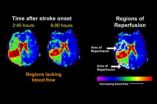(Press-News.org) WEST LAFAYETTE, Ind. - Spicing up your daily diet with some red pepper can curb appetite, especially for those who don't normally eat the popular spice, according to research from Purdue University.
"We found that consuming red pepper can help manage appetite and burn more calories after a meal, especially for individuals who do not consume the spice regularly," said Richard Mattes, distinguished professor of foods and nutrition who collaborated with doctoral student Mary-Jon Ludy. "This finding should be considered a piece of the puzzle because the idea that one small change will reverse the obesity epidemic is simply not true. However, if a number of small changes are added together, they may be meaningful in terms of weight management. Dietary changes that don't require great effort to implement, like sprinkling red pepper on your meal, may be sustainable and beneficial in the long run, especially when paired with exercise and healthy eating."
Other studies have found that capsaicin, the component that gives chili peppers their heat, can reduce hunger and increase energy expenditure - burning calories. The amounts tested, however, were not realistic for most people in the U. S. population, Mattes said.
The current study measured the spice's effects using quantities of red pepper - 1 gram or half a teaspoon - that are acceptable for many consumers. Other studies also have looked at consumption via a capsule, but Ludy and Mattes' study demonstrated that tasting the red pepper may optimize its effects. The findings are published in Physiology & Behavior.
This study used ordinary dried, ground cayenne red pepper. Cayenne is a chili pepper, which is among the most commonly consumed spices in the world. Most, but not all, chili peppers contain capsaicin.
Twenty-five non-overweight people - 13 who liked spicy food and 12 who did not - participated in the six-week study. The preferred level of pepper for each group was determined in advance, and those who did not like red pepper preferred 0.3 grams compared to regular spice users who preferred 1.8 grams. In general, red pepper consumption did increase core body temperature and burn more calories through natural energy expenditure.
This study found that those who did not consume red pepper regularly experienced a decrease of hunger, especially for fatty, salty and sweet foods.
"The appetite responses were different between those who liked red pepper and those who did not, suggesting that when the stimulus is unfamiliar it has a greater effect. Once it becomes familiar to people, it loses its efficacy. The finding that there is a difference between users and non-users is novel and requires further study to determine how long it will be effective and how to adjust the diet to improve continuous effectiveness."
The failure to account for individual differences in liking the burn of chili peppers may explain why some previous studies varied on capsaicin's impact on appetite suppression and thermogenic response, which is an increase in body heat produced when digesting food.
Mattes said the findings also show that red pepper should be consumed in non-capsule form because the taste - the sensory experience - maximizes the digestive process.
"That burn in your mouth is responsible for that effect," he said. "It turns out you get a more robust effect if you include the sensory part because the burn contributes to a rise in body temperature, energy expenditure and appetite control."
Mattes, who specializes in taste and directs Purdue's Ingestive Behavior Research Center, studies the role taste plays in feeding and digestion.
"Taste works on two very different levels," he said. "First, it determines the palatability of foods, and that influences food choice. Second, it influences physiology, so it alters how you digest foods and the efficiency with which you absorb the nutrients from them and use them throughout the body."
INFORMATION:
The study was funded by the National Institutes of Health under the Ruth Kirschstein National Research Service Award and by the McCormick Science Institute.
Writer: Amy Patterson Neubert, 765-494-9723, apatterson@purdue.edu
Source: Richard Mattes, 765-494-0662, mattes@purdue.edu
Abstract on the research in this release is available at: http://www.purdue.edu/newsroom/research/2011/110425MattesPepper.html
END
If you want to keep your brain healthy, it turns out that visiting friends, attending parties, and even going to church might be just as good for you as crossword puzzles.
According to research conducted at Rush University Medical Center, frequent social activity may help to prevent or delay cognitive decline in old age. The study has just been posted online in the Journal of the International Neuropsychological Society.
The researchers were especially careful in their analysis to try to rule out the possibility that cognitive decline precedes, or causes, social isolation, ...
NORMAN, Okla. – Faculty from the University of Oklahoma School of Meteorology are leading the school's predictability research initiatives with multiple projects that could one day lead to more accurate forecasts of weather-related events, including landslides and tornadoes.
In the Southern Plains region of the United States, people think of thunderstorms and tornadoes when severe weather is forecasted. However, the OU School of Meteorology is interested in a broad range of weather phenomena and its impacts.
As an example of the breadth of OU's program, one of the researchers, ...
Red light ticket laws are creating more expensive tickets and citations for area drivers. The state of California constantly updates these laws and legislation to impose more fines and penalties when red light and speeding violations occur. Your Ticket Doctor is the gateway to a traffic ticket defense for residents that want to contest a speeding or red light ticket in a court of law. They have now launched a new website with informative information about all kinds of traffic tickets.
Many people search the Internet for how to fight speeding tickets. There is a variety ...
Cholesterol-lowering drugs known as statins may help clot-busting drugs treat strokes, according to researchers at Washington University School of Medicine in St. Louis.
The research involved 31 patients with ischemic stroke, a disorder when a clot blocks blood flow to part of the brain. In 12 patients who were already taking statins to control their cholesterol, blood flow returned to the blocked areas of the brain more completely and quickly.
"We've known that patients on statins have better stroke outcomes, but the data in this study suggest a new reason why: Statins ...
RIVERSIDE, Calif. – American companies and organizations spend billions of dollars every year on leadership training for their managers. To improve job performance they ought instead to focus on what managers believe about their employees, a study by the University of California, Riverside shows.
How leaders view their employees tends to become a self-fulfilling prophecy, concludes Thomas Sy, assistant professor of psychology at UC Riverside and a longtime business leadership consultant.
In what he describes as the first study to examine leaders' conceptions of followers, ...
Westlake dentist, Dr. Philip Shindler, is now offering CariFree. CariFree is a line of dental products that help to prevent cavities and tooth decay more effectively than traditional dental products, and Dr. Shindler is proud to be able to offer CariFree to his patients.
More Information about CariFree
The reason modern people brush their teeth is to remove bits of food debris that become fodder for bacteria. The bacteria that feed on this debris can eventually spread and infect the teeth, leading to tooth decay. This bacterial infection is called dental caries, and ...
News Release Embargoed until Monday, April 26, 2011, noon EDT.
Please credit CMAJ, not the Canadian Medical Association. CMAJ is an independent medical journal; views expressed here do not necessarily reflect those of its owner, the CMA.
The prevalence of frailty, which is linked to earlier death, increases throughout adulthood as people age and not just after age 65, found an article in CMAJ (Canadian Medical Association Journal) (pre-embargo link only) http://www.cmaj.ca/embargo/cmaj101271.pdf. Relatively good fitness levels at all ages were predictive of lower mortality ...
With the increase in numbers of overweight children and young adults, Canada and other developed countries are facing an obesity epidemic and legislative approaches are required to address this issue, states an article in CMAJ (Canadian Medical Association Journal) (pre-embargo link only) http://www.cmaj.ca/embargo/cmaj101522.pdf.
Canadians have become heavier and less fit over the last three decades; people aged 20-39 years have the BMI (body mass index) that people aged 40 or older had thirty years ago. The 2007-2009 Canadian Health Measures Survey found more than ...
Minority races—especially Blacks—are more willing than Whites to expend personal financial resources to prolong life after being diagnosed with lung or colorectal cancer, even if it means using up all of their personal financial resources. That is the conclusion of a new study published early online in Cancer, a peer-reviewed journal of the American Cancer Society. Delivering quality cancer care that is in accordance with patients' wishes requires a better understanding of the reasons for these differences in preference.
Minority patients receive more aggressive care ...
Inspection of medical records, case files, and legal affidavits provides compelling evidence that medical personnel who treated detainees at Guantánamo Bay (GTMO) failed to inquire and/or document causes of physical injuries and psychological symptoms they observed in the detainees, according to a paper published this week in PLoS Medicine. Vincent Iacopino, Senior Medical Advisor for Physician for Human Rights, and Brigadier General (Ret) Stephen Xenakis, U.S. Army, reviewed GTMO medical records and relevant case files of nine individuals, looking for evidence of torture ...



